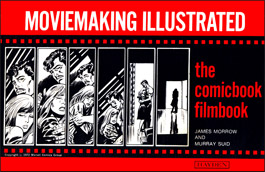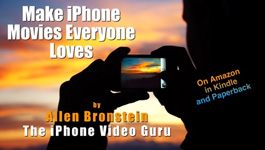MMM: Why did you start the International Mobil Film Festival™?
Botello: I wanted to promote films shot with phones on big screens, and have filmmakers present their films to the audience, and then get trophies. This was in 2010. We are now working on MFF2015, which will be our fourth annual film festival.
MMM: Where did you want it to lead?
 Botello: My goal was to make mobile filmmaking mainstream and respectable within the film industry. It has become passionate work for me outside my love for film and storytelling, which has been with me since, well, birth!
Botello: My goal was to make mobile filmmaking mainstream and respectable within the film industry. It has become passionate work for me outside my love for film and storytelling, which has been with me since, well, birth!
MMM: Were you already involved in filmmaking before IMFF began?
Botello: Yes, in 2006 I was the founder of S. Botello Productions. I also worked in the video production industry since 1998.
MMM: Knowing that others might want to start their own local festivals, can you tell us some of the challenges?
Botello: We struggled to find a venue, which in San Diego can be tough with all the events that take place in “America’s Finest City.” In 2012 Grossmont College sponsored our venue. Red Giant joined us by sponsoring the first prize and we could not be more grateful for both our sponsors.
MMM: What can you tell us about your jury?
Botello: Each year we select a handful of film and entertainment industry professionals, educators with experience in the industry. Our judges included Conrad Mess, Tony Myers of smartmoviemaking.com, Luis Eduardo Juarez of Indiephone™, and Penny Styles who is a well-known producer and founder of Nu Fangled TV and Craig Prater, director of the San Diego Jewish Film Festival. We have two other judges who are also part of our annual sponsors at Grossmont College and instructors in the Media Communications Department, Evan Wirig and William Snead.
MMM: What criteria do the judges use?
Botello: We ask them to rely on their expertise. What some judges like others don’t. It works out in the end. I am just glad I can stay out of it.
MMM: How has your program evolved?
Botello: A key feature is collaborating with other mobile film festivals. We invite them to attend and present a selection of mobile-shot films exhibited in their festivals. For example, this past year Max Schleser from MINA and Massey University in New Zealand did some presentations in our festival. David Cornado from Cinephone in Barcelona also was here. That led to my being one of the judges in this year’s Cinephone Smartphone Film Festival. I am a bit nervous about it since I don’t judge in my own film festival. But it was a request I could not turn down.
MMM: Does your festival operate outside San Diego?
Botello: We are collaborating with Toronto University in Canada to make the film festival in Kenya and to provide mobile filmmaking workshops in Nairobi. We are excited that Conrad Mess will be conducting workshops with us. Tingiweh Godlove Kangai, who is a contributor to our mobile film Community Stories, is also going to collaborate on this project in Africa. http://dreamandbe.com/content/stemwhere-kenya-designbuild-film-festival-preparations
MMM: How much of your time is devoted to the festival?
Botello: It never ends. An example is Community Stories, a year-round project. We are planning workshops in San Diego during the summer and throughout the year and plan to present mobile filmmaking to organizations for inclusion in our programs and to share the benefits of mobile filmmaking in many industries.
MMM: What lies ahead?
Botello: I am not sure, but I did have a vision years ago that I would help create opportunities to spread the love for mobile film to those behind the camera and to those looking for entertainment. One reason we have MFTV is because on YouTube the public has to sift through too much content online to watch something good when it comes to mobile films. My quote for that dilemma is “We have a channel for that!” https://www.youtube.com/user/mobilfilmfestival
MMM: Can you compare mobile film and conventional film?
Botello: The similarities are surprising. The use of accessories and apps help make a mobile film look almost like it was shot with a multi-thousand dollar professional film camera. One of the attendees at MFF2014 said about “The Other Side” by Conrad Mess, “That film was obviously shot by a professional filmmaker with a production company. But I cannot believe they shot it on an iPhone!”
MMM: Is the future of mobile-shot movies on the Web?
Botello: It’s a surprise to people who watch films on their phones and laptops how epic some of the films can look and feel on a big screen. When I phoned Conrad Mess to tell him of his win, at our festival, he said that I was a pioneer because I had the first off-line film festival for mobile film. I didn’t even realize that.
MMM: Do you think mobile moviemaking will become mainstream?
Botello: It will absolutely become a respected way to create stories, videos and yes, cinematic films! For the first time in the history of humanity, human beings around the world are carrying and holding a tool in their hands that is not a stick or a rock but a mobile phone. Story telling and art has been around since the days we lived in caves and it is a big part of cultural civilizations worldwide. I just hope everyone sees what I see in the future of this and mobile phones. That is why I began with a venue and a dare to make films using the cameras on mobile phones.
For more information, visit the International Mobil Film Festival.



 Previous post
Previous post
 Next post
Next post





